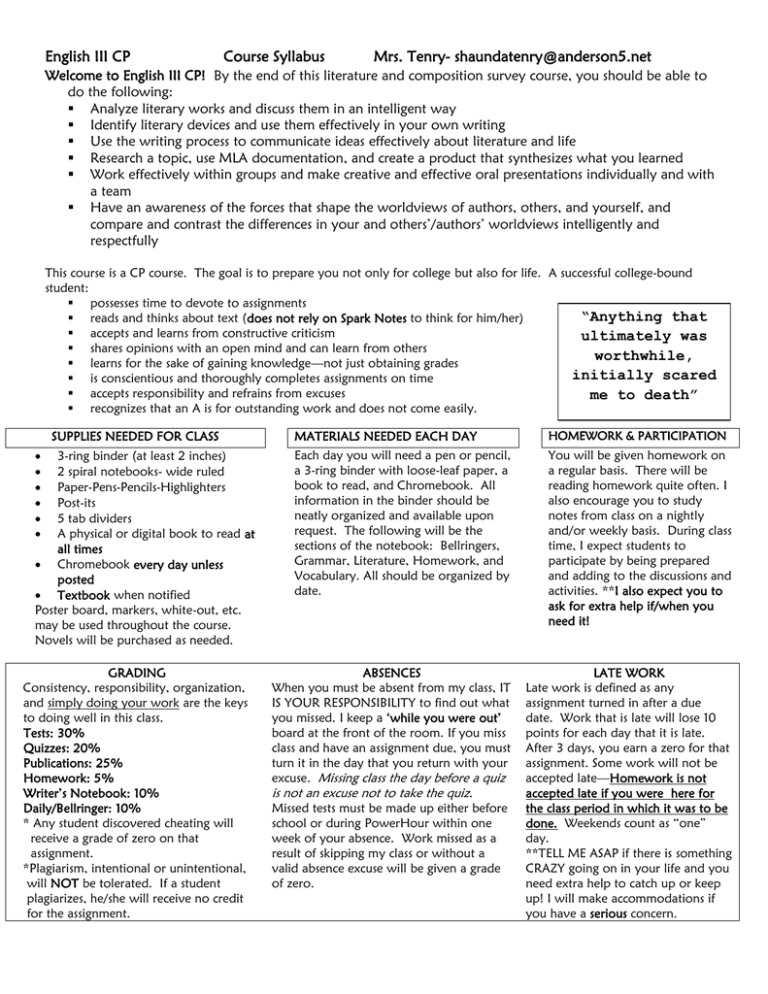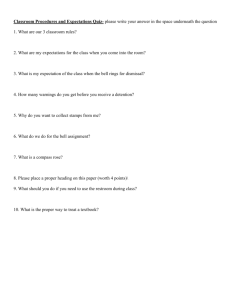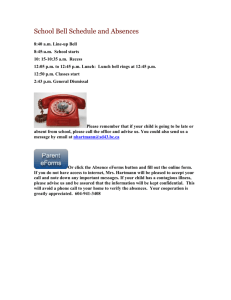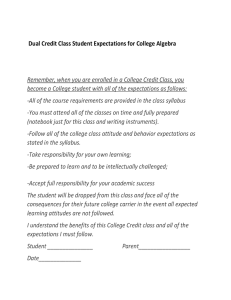English III CP ...
advertisement

English III CP Course Syllabus Mrs. Tenry- shaundatenry@anderson5.net Welcome to English III CP! By the end of this literature and composition survey course, you should be able to do the following: Analyze literary works and discuss them in an intelligent way Identify literary devices and use them effectively in your own writing Use the writing process to communicate ideas effectively about literature and life Research a topic, use MLA documentation, and create a product that synthesizes what you learned Work effectively within groups and make creative and effective oral presentations individually and with a team Have an awareness of the forces that shape the worldviews of authors, others, and yourself, and compare and contrast the differences in your and others’/authors’ worldviews intelligently and respectfully This course is a CP course. The goal is to prepare you not only for college but also for life. A successful college-bound student: possesses time to devote to assignments “Anything that reads and thinks about text (does not rely on Spark Notes to think for him/her) accepts and learns from constructive criticism ultimately was shares opinions with an open mind and can learn from others worthwhile, learns for the sake of gaining knowledge—not just obtaining grades initially scared is conscientious and thoroughly completes assignments on time accepts responsibility and refrains from excuses me to death” recognizes that an A is for outstanding work and does not come easily. SUPPLIES NEEDED FOR CLASS 3-ring binder (at least 2 inches) 2 spiral notebooks- wide ruled Paper-Pens-Pencils-Highlighters Post-its 5 tab dividers A physical or digital book to read at all times Chromebook every day unless posted Textbook when notified Poster board, markers, white-out, etc. may be used throughout the course. Novels will be purchased as needed. GRADING Consistency, responsibility, organization, and simply doing your work are the keys to doing well in this class. Tests: 30% Quizzes: 20% Publications: 25% Homework: 5% Writer’s Notebook: 10% Daily/Bellringer: 10% * Any student discovered cheating will receive a grade of zero on that assignment. *Plagiarism, intentional or unintentional, will NOT be tolerated. If a student plagiarizes, he/she will receive no credit for the assignment. --Betty Bender MATERIALS NEEDED EACH DAY HOMEWORK & PARTICIPATION Each day you will need a pen or pencil, a 3-ring binder with loose-leaf paper, a book to read, and Chromebook. All information in the binder should be neatly organized and available upon request. The following will be the sections of the notebook: Bellringers, Grammar, Literature, Homework, and Vocabulary. All should be organized by date. You will be given homework on a regular basis. There will be reading homework quite often. I also encourage you to study notes from class on a nightly and/or weekly basis. During class time, I expect students to participate by being prepared and adding to the discussions and activities. **I also expect you to ask for extra help if/when you need it! ABSENCES When you must be absent from my class, IT IS YOUR RESPONSIBILITY to find out what you missed. I keep a ‘while you were out’ board at the front of the room. If you miss class and have an assignment due, you must turn it in the day that you return with your excuse. Missing class the day before a quiz is not an excuse not to take the quiz. Missed tests must be made up either before school or during PowerHour within one week of your absence. Work missed as a result of skipping my class or without a valid absence excuse will be given a grade of zero. LATE WORK Late work is defined as any assignment turned in after a due date. Work that is late will lose 10 points for each day that it is late. After 3 days, you earn a zero for that assignment. Some work will not be accepted late—Homework is not accepted late if you were here for the class period in which it was to be done. Weekends count as “one” day. **TELL ME ASAP if there is something CRAZY going on in your life and you need extra help to catch up or keep up! I will make accommodations if you have a serious concern. CLASSROOM RULES I have two main rules: 1. Respect- I believe that respect is something that all people deserve. I take respect seriously, and I expect you to have respect for everyone in this class. This means, among other things, not using language that is demeaning or insulting towards others. 2. Responsibility- You are as responsible for your education as I am. In order for you to be successful in this class, you must take an active role in your education. What you get out of this class will be directly determined by what you put into it. Therefore, you are expected to do all assignments, participate in class, bring materials and a positive attitude every day. If you are not able to do this, you may be removed from class and/or your parents may be called. Parents are also called any time your grade drops below ‘D’ on interims or report cards, and possibly more often than that if needed. ATTENDANCE POLICY ZERO credit will be given for a class if you have more than five absences, even if you have a passing grade. Only absences caused by illness, family member’s illness or death, and/or doctor’s appointments are excused. Excuses must be turned in within ten days after you return to school. Your parents will be called after if you reach three absences in this class. RESTROOM PASSES Students will be given three restroom/locker passes. You will have to use these to go to the restroom during class or to your lockers if you do not have your materials for class. Once the passes are used, you are given lunch detention if you come to class without your materials, or if you want to go to the restroom (unless, of course, there are extenuating circumstances). An unused pass may be turned in for extra credit at the end of the grading period. You are discouraged from using these passes unless it’s an emergency, because when you are out of class, you miss instruction. You are responsible for what you miss when out of the classroom. CONTACT INFO: Mrs. Tenry: 260-5110 ext. 85035 Email: shaundatenry@anderson5.net SUPPLY WISH LIST We will use a lot of supplies throughout the year! I buy many of my own supplies. If you are in a position to donate any of the following to the class, it would be greatly appreciated. Simply bring them to my room at any time . Kleenex and wipes Hand sanitizer, band aids Post-its, printer paper, chart paper, notebook paper, and/or construction paper Old magazines Pencils, pens, dry erase markers, glue sticks PROCEDURES PROCEDURES In this classroom, there is a procedure for everything. A procedure is different from a rule because a procedure is simply “how we do things in here.” With procedures, time will not be wasted and you will know what I expect. 1. Entering the classroom—Immediately find your assigned seat and begin working on the bellringer assignment. If you are still up and moving around the classroom when the bell rings, you will be counted tardy. 2. Exiting the classroom—If I do not announce when you are to pack up your materials, please assume that you are to wait for the bell to ring. When the bell rings, IF I am still talking, you must wait for me to dismiss you. Never line up at the door. 3. Sharpening your pencil, blowing your nose, throwing away trash, etc.—Please refrain from doing these things when I am giving whole class instruction or when we are having a whole-class conversation. 4. Getting your attention—If the room is very noisy, we have a bell that we will ring. When you hear the bell, please be quiet within five (5) seconds and turn towards me. You or your class may be held after the bell if you cannot do so. 5. Completing work early—Turn your paper over and begin reading silently or working on your 3-5 pages. If we are using Chromebooks, you may read online articles, but not play games. Only work on English/reading/writing while in class. You should always have something to read in class. 6. Asking a question—Please raise your hand until I recognize you. If I am lecturing or giving instructions, I may ask you to wait until I am finished. This procedure does not require talking. 7. Food and drinks—These are not allowed in the room. Medical exceptions (with documentation) can be made. 8. Tutoring—Power Hour is available every Monday and Thursday from 3:50-4:50. 9. Homework or Extra Help—If you have a problem with your homework, it is much easier for me to work with you if I have been told before class and if you have at least attempted it. I also encourage you to send me an email before class begins the next day or come see me before school. I am on duty every morning at the front of the school. This shows greater responsibility on your part. 10. Cell phones—Cell phones are not permitted in class and the district policy will be followed at all times. 11. Textbooks/Chromebooks—Unless I notify you otherwise, plan to have your charged Chromebook and textbook every day. 3 times without your Chromebook or textbook per SEMESTER=referral. Uncharged/unusable Chromebook counts towards referrals. 12. Maintaining your Writer’s Notebook—You will keep a Writer’s Notebook, where you will be expected to write 3-5 pages every two weeks. These will be turned in every other Friday. Abstracts: The Crucible and The Great Gatsby are required for all students. The other works may become part of challenge projects that are optional for students. If your child decides to do any of the challenge projects, your child should get your approval to read the work(s) associated with those projects. Your signature on the following page indicates that you grant your approval for your child to read any/all of the works on this list. The Crucible by Arthur Miller This play, considered to be one of Miller’s best, is an historical allegory for the McCarthy period. Although not totally historically accurate, Miller shows that the mere accusation of wrongdoing can wreak havoc in society. The play begins with a group of teen-age girls caught practicing witchcraft in the woods. In order to save their own lives, the girls begin to falsely accuse others in the society of practicing witchcraft. Film critic James Beradinelli comments on its rich themes, “Indeed, its fertile themes – the lure of power, the gullibility of those who believe they have a moral imperative, the need to accept responsibility for the consequences of all actions, and the nature of truth – are universal in scope. Events such as those depicted in The Crucible have recurred with alarming predictability throughout human history.” The play contains sexual imagery and a reference to the adulterous relationship between Abigail Williams and John Proctor. The Great Gatsby by F. Scott Fitzgerald This novel is one of the greatest works set in the Roaring Twenties. It catalogues a new generation who quickly becomes a lost generation. One Fitzgerald scholar says: “It is a wonderful work which displays the penalties of greed, lust, and wealth as well as gives a beautifully accurate depiction of society during a particular era.” Through this novel, Fitzgerald examines the theme of the disillusionment of the American dream. The strength of the novel lies in its symbolic language and intricate plot revolving around the love triangle of Daisy, Tom, and Gatsby. Of Mice and Men by John Steinbeck In 1937 Steinbeck achieved his first literary success with this poignant novel that deals with the plight of two migrant workers in California during the Great Depression. George is a realist who must care for the simplistic and child-like Lennie as they travel from ranch to ranch. Racially offensive language and profanity are used to show the characters’ ignorance and prejudice. The novel’s simple language, plot, and imagery are deceptive. Maturity is needed to understand the life-and-death choices faced by the characters as well as the themes of the American dream, the true nature of friendship, and the dangers of isolating people in society because of their differences. A Raisin in the Sun by Lorraine Hansberry This play is primarily about housing discrimination in the 1950’s shown through the family of the Youngers inspired by Hansberry’s personal life and the Langston Hughes’s poem, “A Dream Deferred.” The Youngers live in an overcrowded apartment in Chicago and constantly bicker over how to spend their newfound wealth, an insurance check from the death of the elder Mr. Younger. Hansberry presents themes of hope and idealism in contrast with themes of despair and fear. David Cooper of Michigan State University says, “It is a play about distress, futility, and tragedy, but also about hope and pride and that kind of conviction and commitment it takes to bring hope out of hopelessness, courage out of fear, and idealism out of fatalism.” This play inspires meaningful discussion about racism and civil rights, and it contains some racially offensive language. Please read the following information, sign where appropriate, and return on Wednesday, August 19. Dear Student: Please read the above syllabus and course information in order that you may be fully aware of the requirements for this class and your responsibility with regard to participation in class. This syllabus is a contract between you and me; therefore, I ask that you sign below in the space indicated and return it to me by Wednesday, August 19, 2015. By signing it, you are indicating that you have both read and understood your responsibilities with regards to this class. Student Signature/date _____________________________/_____________ Dear Parents: After reading the course syllabus, I am fully aware of the requirements of this class and I agree that o I am aware of the course policies, rules, and procedures and will uphold the teacher’s decisions that are governed by these. o I will support my child by asking about grades, progress, assignments, homework, and by stressing the importance of doing well in class. I will communicate proactively with the teacher should I have any concerns. o I realize my child will be held accountable for all deadlines and grades and I understand the late work/make-up work policies. o I approve of my child reading the major required works for this class and any of the optional works he/she chooses (abstracts attached to syllabus). o I will attempt to stay fully informed by reviewing progress reports and contacting the teacher if I have any questions or concerns about my child’s behavior or grades in the class. Parent/Guardian Signature/date _______________________________/____________ Dear Parents and Guardians, My philosophy is that parents and teachers create a partnership that enables students to learn better. To help me see your child through your eyes, please answer the following statements/questions and return to me by Friday, August 21 (your child will receive a 100 just for bringing the work!). 1. What are the best traits/skills/attributes of your child? ____________________________________________________________________________________ ____________________________________________________________________________________ 2. What are the habits/challenges that hinder your child from being as academically and/or socially successful as you would like? ____________________________________________________________________________________ ____________________________________________________________________________________ 3. What would you like to see your child do after high school and in life (career & personal goals)? ____________________________________________________________________________________ ____________________________________________________________________________________ 4. What are your child’s strengths concerning English? ____________________________________________________________________________________ ____________________________________________________________________________________ 5. What are your child’s weaknesses concerning English? ____________________________________________________________________________________ ____________________________________________________________________________________ 6. Is there anything else that I need to know or that you would like to tell me that would help me help your child be successful? ____________________________________________________________________________________ ____________________________________________________________________________________ 7. What is the best method for communicating with you? Parent/Guardian #1 ___________________________ Relationship _______________________ Phone number(s) and time I can best reach you _______________________________________ Email address _____________________________________________________________________ Parent/Guardian #2 ___________________________ Relationship _______________________ Phone number(s) and time I can best reach you _______________________________________ Email address _____________________________________________________________________



